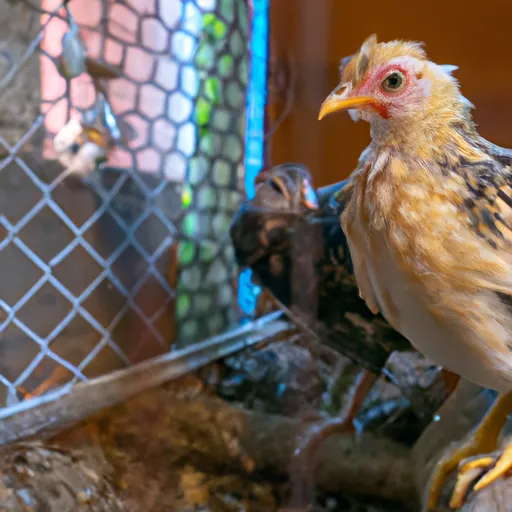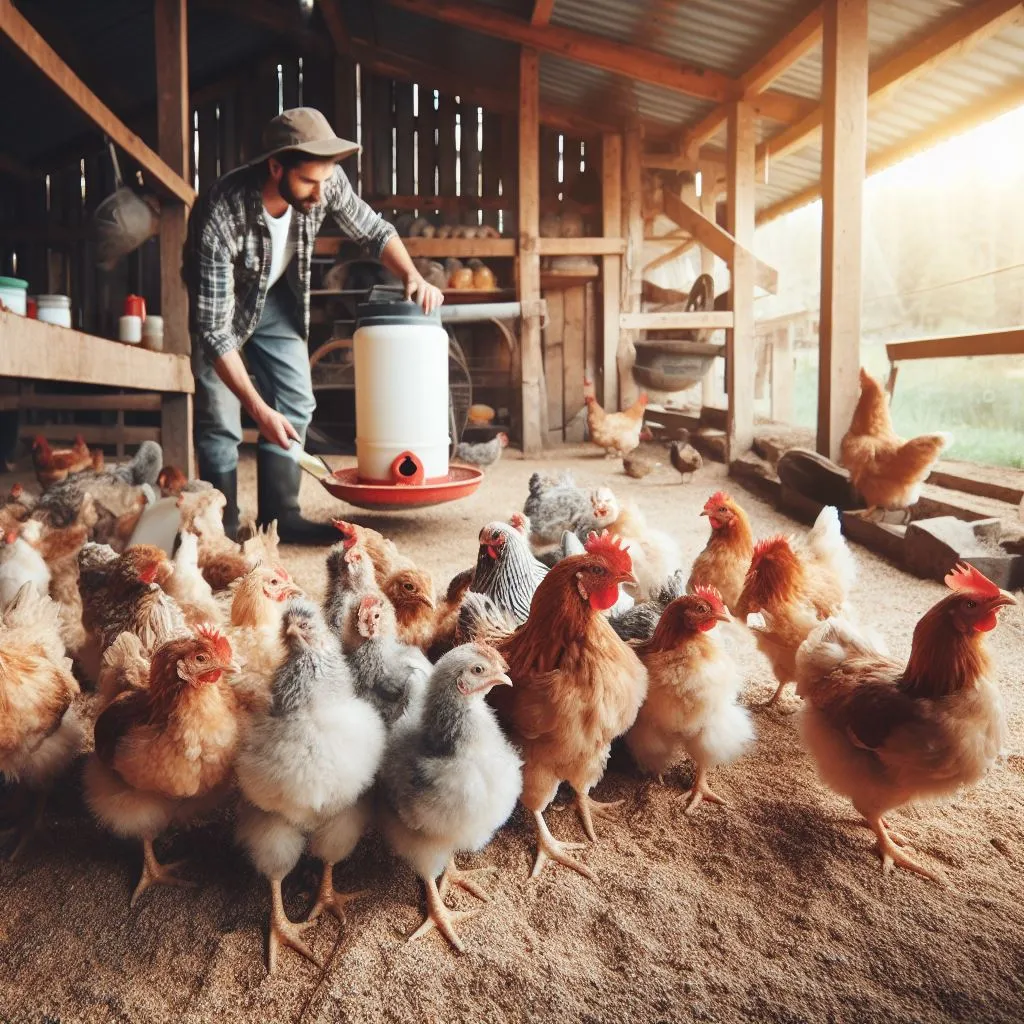Can Chickens Develop Emotional Bonds with Humans?
So, have you ever wondered if chickens can actually develop emotional bonds with humans? It might seem like an odd question, but it turns out that these feathered friends might surprise you.
In this article, we'll explore whether chickens can show affection towards us.
Prepare to be amazed by the unexpected connections these seemingly simple creatures can form with the ones who care for them. It's time to discover the fascinating world of emotional bonds between chickens and humans.
Can Chickens Develop Emotional Bonds with Humans?
Chickens have long been seen as creatures solely raised for their meat and eggs, lacking the ability to form emotional connections with humans.
However, recent research and observations from chicken owners have challenged this perception.
It turns out that these seemingly simple birds are capable of developing emotional bonds with humans, displaying affection and recognizing familiar faces. In this article, we will explore the evidence and factors that contribute to emotional bonding between chickens and humans.
Research on Chicken Emotions
Scientific studies on chicken emotions are relatively new, but they have shed light on the complex emotional lives of these birds.
Researchers have found that chickens experience a wide range of emotions, including fear, happiness, and even a sense of social belonging.
These studies have used various methods such as behavioral observations, physiological measurements, and brain scans to uncover the emotional responses of chickens.
The Complexity of Chicken Emotions
Contrary to popular belief, chickens are not emotionless creatures. They exhibit a complex range of emotions similar to mammals and other higher-order animals.
For example, studies have shown that chickens experience negative emotions like stress and fear in response to specific stimuli, such as the presence of predators or overcrowding.
On the other hand, they also exhibit positive emotions, like excitement and pleasure when engaging in activities they enjoy, such as dust bathing or foraging.
Evidence of Emotional Bonding
While scientific research provides valuable insights into chicken emotions, anecdotal evidence from chicken owners provides a more personal perspective on the emotional connections between chickens and humans.
Many chicken owners report instances of their birds forming deep bonds with them and displaying affectionate behavior. These observations include chickens seeking human company, following their owners around, and even displaying signs of distress when separated from them.

Observations from Chicken Owners
Chicken owners have reported various instances that suggest emotional bonding between humans and chickens. Some owners claim that their chickens come running towards them when called or even show excitement upon seeing them.
They describe instances where their chickens perch on their shoulders, cuddle with them, and seek physical contact. These behaviors suggest a level of emotional connection beyond the basic needs of food and shelter.
Anecdotal Evidence of Emotional Connections
In addition to these observations, there are countless anecdotes from chicken owners that highlight the emotional connections between humans and chickens.
These stories often involve rescued chickens or birds that have been hand-reared from a young age. Owners describe their chickens as companions, expressing joy, and providing comfort during difficult times.
These anecdotes demonstrate the capacity of chickens to form emotional bonds and the impact of such bonds on both human and chicken well-being.
Human-Chicken Interactions
The interactions between humans and chickens play a significant role in the development of emotional bonds.
Regular human contact has been found to have a profound effect on chicken behavior and their perception of humans. Chickens that have frequent positive interactions with humans are more likely to form emotional connections and display affectionate behaviors.
Impact of Human Interaction on Chicken Behavior
Human interaction can shape chicken behavior in various ways. Chickens that have been handled gently and positively since a young age tend to be more tame, trusting, and comfortable in the presence of humans.
On the other hand, chickens that have had negative experiences or limited interaction with humans may exhibit fear, aggression, or avoidance behaviors.
These behavioral responses highlight the importance of early and positive human interaction in building emotional bonds with chickens.
Effects of Regular Human Contact
Regular human contact has been shown to have a range of positive effects on chicken behavior. Chickens that are accustomed to human presence from an early age are more likely to approach and interact with humans willingly.
They may seek physical contact, allow themselves to be handled, and even display signs of excitement when humans are present. This highlights the capacity of chickens to form emotional bonds with humans through regular positive interactions.
Chicken Behavior towards Different Humans
Interestingly, chickens can distinguish between different humans and exhibit varying behavior towards them. Chickens that have developed emotional bonds with specific individuals may show increased trust, comfort, and affection towards those individuals.
They may approach and interact more readily with familiar humans compared to unfamiliar ones. This suggests that the emotional bond between chickens and humans is not solely based on human presence but is specific to individual relationships.
Social Structure and Hierarchies
To understand chicken behavior and their capacity for emotional bonding, it is essential to consider their social structure and hierarchies. Chickens are social animals that establish hierarchies within their flocks.
These hierarchies determine pecking order, access to resources, and social interactions. Understanding the social dynamics of chickens can provide insights into their capacity for emotional connections with humans.
Communication and Signaling Among Chickens
Chickens communicate and signal with one another through various vocalizations, body postures, and behaviors.
They use these signals to establish social order, display dominance, and express emotions. Chickens are sensitive to social cues and respond to them accordingly.
This ability to communicate and perceive social signals contributes to their capacity for emotional bonding with humans.
Duration of Interaction
The duration of interaction between humans and chickens plays a crucial role in the development of emotional bonds. Regular and prolonged interactions provide opportunities for chickens to become familiar with human presence and behavior. Spending time together allows chickens to observe and understand human cues and establish trust, which is essential for emotional bonding.
Quality of Interaction
The quality of interaction is equally vital in creating emotional bonds with chickens.
Gentle handling, positive reinforcement, and respectful behavior toward chickens contribute to their sense of safety and well-being.
Conversely, negative experiences, rough handling, or aggression can hinder the development of emotional bonds and result in fear or avoidance behaviors.
Consistency and Routine
Consistency and routine are key factors in building emotional bonds with chickens.
Frequent and predictable interactions help chickens establish a sense of trust and security. When chickens can anticipate human presence and behavior, they are more likely to form emotional bonds.
Conversely, irregular or unpredictable interactions can lead to anxiety and confusion in chickens, hindering the development of emotional connections.
Positive Reinforcement
Positive reinforcement is an effective tool in building trust and emotional bonds with chickens.
Rewarding desired behaviors, such as approaching humans willingly or interacting calmly, reinforces the positive associations chickens have with human presence.
Providing treats, praise, or gentle strokes when chickens display affectionate behaviors helps create positive experiences and strengthens the emotional bond between chickens and humans.
Chicken Social Structure
Chickens are social animals that establish intricate social structures within their flocks.
These social structures influence their behavior, communication, and capacity for emotional bonding. Understanding the social dynamics of chickens can help humans foster emotional connections and provide appropriate social environments for their feathered companions.
Importance of Social Interactions for Chickens
Social interactions are crucial for the well-being of chickens. Chickens thrive in environments that allow for socialization and group dynamics. They seek companionship, engage in communal activities, and learn from one another.
Providing opportunities for chickens to interact with humans in a positive and social context can foster emotional bonds and enrich their lives.
Recognition of Familiar Humans
Chickens have the ability to recognize familiar humans. Through visual and auditory cues, chickens can distinguish one human from another.
They can remember and associate specific individuals with positive or negative experiences. This recognition plays an important role in the development of emotional bonds and influences the behavior of chickens towards familiar humans.
Attachment and Emotional Responses
Chickens that have formed emotional bonds with humans may display attachment behaviors and emotional responses towards them.
These behaviors can include showing excitement, seeking physical contact, following humans around, or displaying signs of distress when separated from their preferred human companions.
These responses highlight the depth of emotional connection that chickens can develop with humans.
Visual and Auditory Recognition
Chickens rely on their visual and auditory senses to recognize familiar humans. They can distinguish individual humans based on their appearance, voice, and even scent.
Visual recognition includes factors such as body shape, facial features, clothing, and movement patterns. Auditory recognition involves associating specific vocal cues or tones with particular individuals.
These recognition mechanisms allow chickens to differentiate between familiar and unfamiliar humans and influence their behavior accordingly.
Memory and Association
Chickens have a remarkable memory and association abilities, allowing them to form lasting connections with familiar humans.

They can remember past interactions, associate specific experiences or emotions with particular humans, and modify their behavior accordingly. Positive experiences with humans build trust and strengthen emotional bonds, while negative experiences can lead to fear or avoidance.
The ability of chickens to associate humans with positive or negative outcomes plays a significant role in their emotional connections.
Building Trust with Chickens
Trust is the foundation of emotional bonding between chickens and humans.
Building trust requires patience, consistency, and gentle handling. Spending time in close proximity to chickens without imposing sudden movements or loud noises helps them feel safe and secure.
Gradually introducing touch and physical contact, respecting their boundaries, and rewarding calm behavior all contribute to building trust. Trust is essential for chickens to form emotional bonds and display affectionate behaviors towards humans.
Positive Experiences and Behavioral Conditioning
Positive experiences and behavioral conditioning are key elements in developing emotional bonds with chickens.
Rewarding desired behaviors, such as approaching humans willingly or remaining calm during interactions, reinforces positive associations with human presence. Offering treats, praise, or gentle strokes when chickens display affectionate behaviors helps create positive experiences.
Through this conditioning, chickens learn to associate human presence with positive outcomes, strengthening their emotional connection and willingness to engage with humans.
In conclusion, chickens are not emotionless creatures but rather possess a capacity for emotional connections with humans.
Scientific research and anecdotal evidence demonstrate that chickens can form emotional bonds, display affection, and recognize familiar humans.
Factors such as the quality and duration of interaction, consistency, positive reinforcement, and trust-building play crucial roles in establishing emotional connections with chickens. Understanding and nurturing these emotional bonds can enhance the well-being of both chickens and their human companions.
